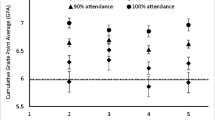Abstract
In a problem-based learning system the acquisition of knowledge is initiated and structured by the analysis of problem tasks. Students are expected to state learning objectives for themselves, depending on their interpretation of the problem description. It is claimed that this process of self responsible, intrinsically motivated learning results in stable, firmly anchored knowledge and establishes the students' steady growth in the professional domain. This could be contrasted with the short term oriented, test directed learning activities in traditional curricula, where students' mastery of a (sub)domain of knowledge is, to a large degree, course bounded.
In the construction of assessment procedures within a problem-based curriculum special consideration has to be given to the congruence of instruments with the claims as mentioned regarding student behaviour. Progress testing is used as a means for leaving the maximum freedom of learning to students whilst still validly cover the content of the professional domain. Besides this category of knowledge testing other tests play a more or less dominant role, such as testing of professional skills, and, to some degree, knowledge testing in connection with specific courses (so called block tests).
In this study the role of progress testing in students' behaviour and students' perceptions are explored within the context of the Health Sciences curriculum in Maastricht. The findings support the claim that progress testing favors learning processes that are characterized as meaning oriented in contrast to reproduction oriented learning. Success in block tests, on the other hand, is better explained by aspects of effort and organization in studying, aspects that generally have been found to be interpretable in terms of achievement orientation. Still, in the perception of students, block tests are seen as more rewarding, and progress tests are not taken to be effective means to trigger self-responsible, free and interest based learning, at least not within an assessment system where both progress tests and block tests are summatively used.
Similar content being viewed by others
References
Alba, J.W. & Hasker, L. (1983). Is memory schematic?Psychological Bulletin 93: 203–231.
Ausubet, D.P., Novak, J.D. & Hanesian, H. (1978).Education Psychology: A Cognitive View. New York: Holt, Rinehart & Winston.
Beckwith, J.B. (1991). Approaches to learning, their context and relationship to assessment.Higher Education 22: 17–30.
Berkel, H.J.M. van (1990). Assessment in a problem-based medical curriculum.Higher Education 19: 123–146.
Berkel, H.J.M. van (1993). Short and long-term memory assessment tests in a first year health sciences course.Paper presented at the First International Symposium on Assessment, Malaysia.
Berkel, H.M.J. van, Sprooten, J. & DeGraaff, E. (1993). An individualized assessment test consisting of 600 items. The development of a progress test for a multi-master program health sciences' curriculum, in P.A.J. Bouhuijs, H.G. Schmidt & HJ.M. van Berkel, eds,Problem-Based Learning as an Educational Strategy. Maastricht, the Netherlands: Network of Community-Oriented Sciences.
Biggs, J.B. (1978). Individual and group differences in study processes.British Journal of Educational Psychology 48: 266–279.
Crombag, H.F.M., Gaff, J.G. & Chang. T.M. (1975). Study behaviour and academic performance.Tijdschrifl voor Onderwijsresearch 1: 3–14.
Entwistle, N.J. & Ramsden, P. (1983).Understanding Student Learning. London: Croom Helm.
Entwistle, N.J. & Wilson, J.D. (1977).Degrees of Excellence —The Academic Achievement Game. London: Hodder & Stoughton.
Eysenck, M.W. (1984).A Handbook of Cognitive Psychology. Hillsdale, NJ: Erlbaum.
Marton, F. (1975). On non-verbatim learning 1. Level of processing and level of outcome.Scandinavian Journal of Psychology 16: 273–279.
Marton, F. (1985). Exploring the means through which learners arrive at differing meanings, in G. d'Ydewalle, ed,Cognitive Information Processing and Motivation. Amsterdam: Elsevier.
Meerum Terwogt, K. (1990). [Analysis of output problems in Dutch higher education.] Amsterdam: University of Amsterdam.
Norman G.R., Tugwel, P., Feightner, J.W., Muzzin, L.J. & Jacoby, L.L. (1985). Knowledge and clinical problem solving.Medical Education 19: 344–356.
Nuy, H.J.P. (1991). Interactions of study orientation and students' appreciation of structure in their educational environment.Higher Education 27: 267–27'4.
Ramsden, P. (1988). Context and strategy: Situational influences on learning, in R.R. Schmeck, ed,Learning Strategies and Learning Styles. New York: Plenum Press.
Schmeck, R.R. (1983). Learning styles of college students, in R.F. Dillon & R.R. Schmeck, eds,Individual Differences in Cognition. New York: Academic Press (volume 1).
Schmeck, R.R., Ribich, F. & Ramanaiah, N. (1977). Development of a self-report inventory for assessing individual differences in learning processes.Applied Psychological Measurement 1:413–431.
Sprooten, M.A.B.J. & Van der Vleuten, C.P.M. (1983). The Measurement of Growth in Medical Knowledge in a Non-Departmental Organized Medical School.Proceedings of the Twenty Second Annual Conference on Research in Medical Education. Washington, U.S.A.
Thomas, P.R. & Bain, J.D. (1982). Consistency in learning strategies.Higher Education 11: 249–259.
5Thomas, P.R. & Bain, J.D. (1984). Contextual dependence of learning approaches: The effects of assessments.Human Learning 3: 227–240.
Vermunt, J.D.H.M.(1992). [Learning styles and regulation of learning in higher education.] Tilburg: Brabant University.
Verwijnen, G.M., Van der Vleuten, C. & Imbos T. (1989). A comparison of an innovative medical school with traditional schools: An analysis in the cognitive domain, in T. Khattab, H.G. Schmidt, Z. Nooman & E. Ezzat, eds,Innovation in Medical Education: An Evaluation of Its Present Status. New York: Springer.
Willoughby, T.L. & Hutcheson, W.J. (1978). Edumetric validity of the quarterly profileexamination. Educational and Psychological Measurement 38: 1057–1061.
Watkins, D. (1982). Factors influencing the study methods of Australian tertiary students.Higher Education 11: 369–380.
Watkins, D. (1983). Assessing tertiary study processes.Human Learning 2: 29–37.
Watkins, D. & Hattie, J. (1981). The learning processes of Australian university students: Investigations of contextual and personological factors.British Journal of Educational Psychology 51: 384–393.
Wijnen, W.H.F.W. & Bouhuijs, P.A.J. (1986). The Maastricht Progress Test: An Example of Comprehensive Knowledge Testing.Paper presented at the 97 th Annual Meeting AAMC, New Orleans.
Author information
Authors and Affiliations
Rights and permissions
About this article
Cite this article
Van Berkel, H.J.M., Nuy, H.J.P. & Geerligs, T. The influence of progress tests and block tests on study behaviour. Instr Sci 22, 317–333 (1994). https://doi.org/10.1007/BF00891784
Issue Date:
DOI: https://doi.org/10.1007/BF00891784




